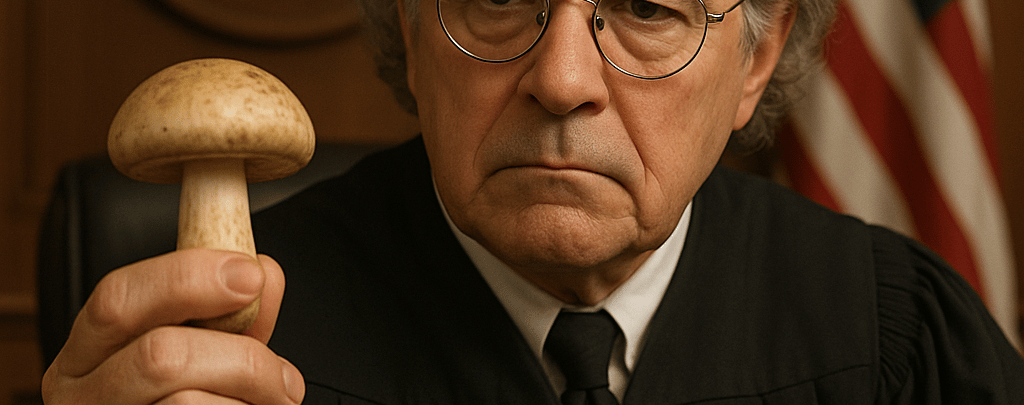The Global Landscape of Psilocybin Legality
A blog post exploring the history and legality of psilocybin mushrooms
Drew Donaldson
6/4/20254 min read


The History and Legality of Psilocybin: From Ancient Ritual to Modern Reform
Humans have used psilocybin-containing mushrooms for thousands of years. Our relationship with this medicine runs deep. It is at our core. In our stories, our folk tales and myths. Archaeological evidence from Mesoamerica—including mushroom-shaped stones and murals—suggests that indigenous peoples used them in religious ceremonies as early as 1000 BCE. The Aztecs even referred to them as teonanácatl, or "flesh of the gods." Their use of this medicine wasn't recreational - they believed the mushrooms granted access to the divine (a claim most seasoned psychonauts would have trouble refuting).
Spanish conquistadors in the 16th century documented these rituals: sometimes with awe, sometimes with simple disdain. The Catholic Church, however, was unequivocal in its approach. If anyone were to grant access to god, it would be them. They quickly moved to suppress the Aztecs' rituals and the mushroom culture that surrounded them. The use of psilocybin was pushed into the underground.
Rediscovery in the West
In 1957, a Life magazine article by R. Gordon Wasson introduced psilocybin mushrooms to a Western audience. In Wasson, the mushrooms found an unlikely and vociferous ally. Wasson, a former banker for J.P.Morgan, had switched careers to writing and ethnomycology, despite lacking any formal training. His subsequent participation in a Mazatec ceremony proved life-changing. Led by María Sabina, a local healer and shaman, he experienced vivid visual and auditory hallucinations, as well as a deep sense of spiritual connection. The recounting of his story hit a nerve, captivating the public and sparking new interest in psychedelics. Unfortunately, this was at María Sabina's expense. Reneging on a promise to maintain her anonymity, Wasson thrust the shaman into an unwanted spotlight. She was seen as a traitor by her community and rejected.
The cat, however, was out of the bag. Soon after Wasson's article, Swiss chemist Albert Hofmann—already famous for synthesising LSD—isolated psilocybin and psilocin from Psilocybe mexicana mushrooms. It quickly became a tool for researchers exploring consciousness, creativity, and mental health. As America stood on the cusp of a cultural revolution, psilocybin (like Jimi Hendrix at Woodstock) was ideally placed to take centre stage.
The Backlash
The 1960s counterculture movement was a big deal. Both socially and politically, it rejected mainstream American values and norms, advocating for peace, love, and a positive shift in human consciousness. It challenged traditional authority, promoted individual freedom, and questioned established social structures. In retrospect, it was no surprise that recreational psychedelic use surged - or that the government reacted. In 1970, the U.S. government passed the Controlled Substances Act, classifying psilocybin as a Schedule I drug, meaning it was deemed to have:
A high potential for abuse
No accepted medical use
A lack of accepted safety for use under medical supervision
Many countries followed suit under the 1971 UN Convention on Psychotropic Substances, effectively criminalising psilocybin worldwide.
A Modern Renaissance
Luckily, despite decades of prohibition, the tide has gradually been turning. In the 2000s, researchers resumed clinical studies on psilocybin under tightly controlled settings. Studies from institutions like Johns Hopkins, NYU, and Imperial College London found psilocybin to have numerous medicinal and psychological benefits. These include:
Treatment for depression
Alleviation from anxiety (especially in terminal illness)
Alleviation of PTSD
Help in breaking addiction
What's more, participants in medical trials often describe profound, mystical experiences; deep, inward journeys that reshape perspectives on life, death and their sense of self. It feels like the Western world is finally reaching a point of acknowledgement, recognising what indigenous peoples have known for centuries.
The Legal Landscape Today
Despite this renewed interest in psychedelics and their benefits, however, the legal status of psilocybin remains largely unchanged. For now, in most countries, it remains illegal. This may or may not affect your decision to use psilocybin in your country of residence (after all, in many places it is freely available growing out of the ground!) However, if you are more comfortable consuming psilocybin in a legal setting, you may want to consider the following. As of mid-2025:
Illegal
In most countries, psilocybin is classified as an illegal, controlled substance—often with no legal medical or therapeutic use. This includes:
United States (federal level)
Schedule I drug (though some states/cities have decriminalised or allowed medical use)
United Kingdom
Class A drug (strictly prohibited)
Australia
Schedule 9 (prohibited), though exceptions exist for medical use
Japan, China, Russia, Singapore
Strict prohibition with severe penalties
Decriminalised or Medical Use Permitted
United States
Psilocybin has been decriminalised in Oregon and the following cities: Denver, Oakland, Santa Cruz, Washington, D.C., Somerville, Cambridge, Northampton, Seattle, and Detroit.
It is also legal for medical use in Oregon (2020), Colorado (2022
Canada
Illegal nationally, but exemptions are granted for some medical/therapeutic use.
There is Ongoing regulatory development toward legalised psychedelic therapy
Australia
As of 2023, authorised psychiatrists may prescribe psilocybin for treatment-resistant depression
Legal or Unregulated
Netherlands
Psilocybin mushrooms are banned, but psilocybin truffles (the underground part of the fungus) are legal and sold in smart shops
Jamaica
Psilocybin is completely legal; used in retreats and therapeutic settings without restriction
Brazil
No specific laws banning psilocybin mushrooms; they are technically legal but not widely used or regulated
Portugal
All drugs are decriminalised for personal use, but not legalised or sold commercially
Conclusion
Psilocybin has journeyed from sacred tool to outlawed drug, and now to promising therapy. Its resurgence is part of a larger reevaluation of psychedelics, mental health, and our understanding of consciousness. As laws and public attitudes continue to evolve, psilocybin may finally find its rightful place in both medicine and culture—rooted in ancient wisdom and informed by modern science. That is certainly our hope. Until that time, be aware of psilocybin's legal status and only consume it in a setting you feel comfortable with. For guidelines on psilocybin dosing, click here.
